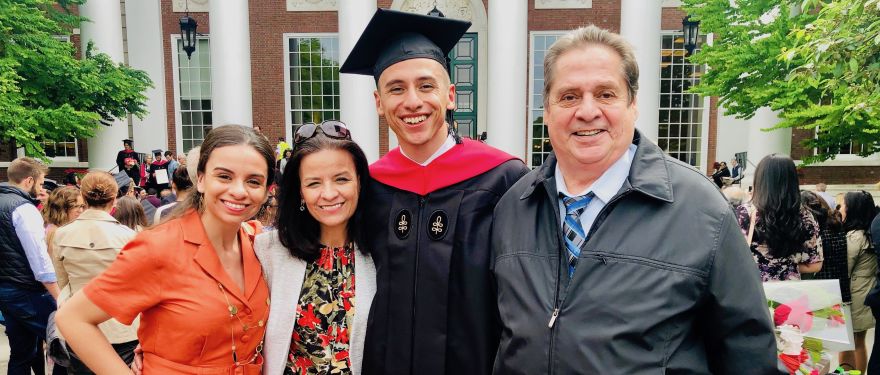Michael Rodriguez (MBA '19) was born and raised in Los Angeles, CA and majored in Industrial & Systems Engineering at the University of Southern California. After college, he worked at NBC Universal for five years in various strategy, finance, and operations roles. Michael went on to become the co-president of the Media and Entertainment Club and co-chair of the Media and Entertainment Conference during his time at HBS and is about to start a position working internationally for Amazon Studios. Long term, Michael wants to build a multimedia company that produces powerful stories that inspire change on a global scale and challenge our understanding of society.
Two months ago, I graduated from Harvard Business School. It still feels like a dream that I was even admitted. I feel so blessed and grateful to have had the opportunity to call this place home for the last two years. The friends I've made and the experiences we've shared have been nothing short of transformative for me both personally and professionally. However, my time at HBS was a whirlwind of an experience – I felt like I learned so much but didn’t always have the time to process it. Before the next chapter in my life begins, I wanted to take some time to reflect on the takeaways this journey has instilled in me.
1. "Develop questions, not answers, from every class."
In September of 2017, HBS Professor Clay Christiansen gave a talk on how to get the most out of HBS, and “develop questions, not answers, from every class” was his first piece of advice. It wasn't until after I graduated, however, that I would fully understand those words. I would often leave class with so many more questions than I had before going in. ‘How do you best manage the negative externalities of capitalism without halting innovation?’ ‘What role should large businesses play in our society?’
I would become more conflicted in my opinion regarding an issue and naturally wanted to hear the "right" answer in the wrap-up from the Professor. Instead, their wrap-ups usually ended with even more questions! It could be frustrating at times. Looking back, I think I learned the most when my friends and I were so torn on an issue that we would continue debating it right after class and carry the conversation all the way through lunch.
I realized that it was going to take much longer than one case discussion to answer the most important questions. If there is one thing that I am more confident about as the result of the case method, it's in my ability to ask better questions. I take the time to pause if I ever find myself in a situation where I am so sure I know the right answer. HBS is not designed to just give you the playbook to business. I think it's one thing to know that going in, and quite another to experience it firsthand.
2. "Make sure your actual strategy matches your intended strategy."
I took a class called “Building and Sustaining Successful Enterprises” during my second year (EC year). I wanted to understand how companies can disrupt themselves and keep innovating. In this class, we talked about the difference between intended strategies and actual strategies. Former Intel Chairman Andrew Grove said it best: "To understand a company’s actual strategy, pay attention to what they do, rather than what they say." Actual strategies are manifested by the products, processes, and services that managers allocate resources to rather than the ideas generated in the boardroom. Ultimately, the two don't always align, so it takes a constant feedback loop to keep them in sync.
This concept really resonated with me because it forced me to look at my everyday life through a new lens. How did my actual strategy align with how I intended to spend my time at HBS? What will I do to ensure that I balance my personal and professional goals in life moving forward? My strategy is revealed through decisions I make every day and how I spend my time. If I do not create time to reflect and reassess, I can easily find myself off-track.
3. Be a leader who makes a difference in the world.
My final takeaway is inspired by the school's mission statement. I have been reflecting on this since I wrote my essay for my HBS application three years ago. It has acted as my central focus to sharpen what my definition of leadership is and how I want to apply it to my life. Before HBS, I had an expansive list of what it means to be a leader and every class allowed me to dive into that more deeply. After 500 cases over two years though, I’ve realized that the most important meaning for me is the idea of service driven leadership - those are the types of case protagonists I vividly remember and admire the most. It’s the idea that effective leadership can be measured by the impact you have on others and is exemplified by serving with integrity and having empathy and compassion. It is about inspiring people to be their very best, with or without your presence.
For me, my "world" has always encapsulated my personal life just as much as my professional life. Becoming a better son, brother, future husband, and future father is something I care deeply about. If anything, going through business school has made me realize even more how important my personal life is to me. In time, I hope to one day lead a company that can inspire change and is measured by the impact it has on real people; I want the life I lead to do the same.

